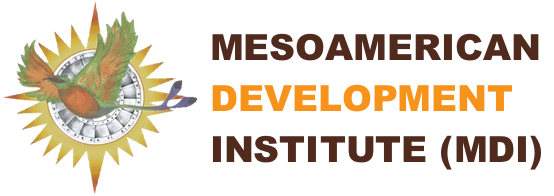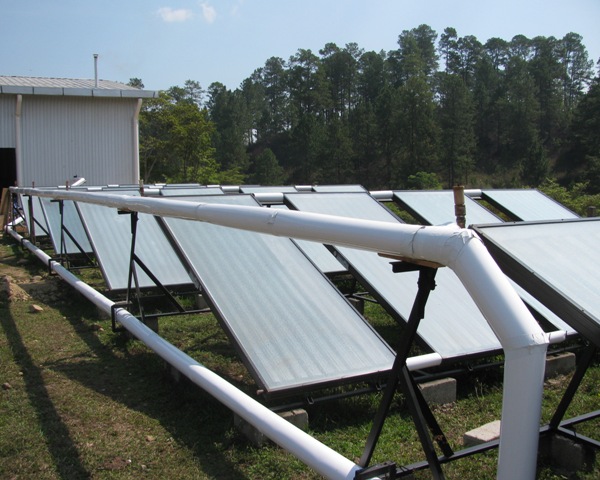The Mesoamerican Development Institute (MDI) is partnering with the University of Massachusetts to address threats to tropical forests and water resources in the coffee producing regions surrounding national parks in the Department of Yoro, Honduras. Expanding coffee production throughout the region is replacing tropical forests, including cloud forest, rain forest and pine-oak forest; impacting the headwaters for watersheds. Compounding the problem is the use of firewood from tropical forests to provide the thermal energy required for the industrial drying of the annual coffee harvest.
MDI is pleased to announce the first sale of carbon offsets in support of a new model of sustainable coffee production linking land-sparing, forest-friendly coffee production with processing using renewable energy technology. The initial sale of 4,092 metric tons of carbon dioxide offsets to Bewley’s Limited, a coffee company based in Dublin Ireland, is a major milestone for an alternative model of sustainable coffee that is being promoted by the Yoro Biological Corridor Initiative in Honduras—an Initiative to scale up the technology and production method using public/private sector collaboration.
The over-the-counter sale provides a market incentive for the adoption of Integrated Open Canopy™ (IOC) coffee farms, which conserve and/or regenerate an area of forest habitat at least equal to the area under coffee cultivation. The Yoro Biological Corridor Initiative will promote the transition to IOC coffee farms at a landscape level to provide habitat for biodiversity and protect the headwaters of threatened watersheds that provide drinking water for municipalities and water for the nation’s largest hydropower utility (300MW) at the El Cajon Reservoir. IOC production is combined with the industrial use of solar and biofuel energy, which eliminates the use of firewood (and its associated emission of carbon dioxide during combustion) derived from tropical forests for the drying of the annual coffee harvest, creating a high-quality carbon transaction.
The sale of carbon offsets represents approximately 25% of the net income derived from coffee revenue for the typical coffee farmer. This innovation rewards farmers who are conserving and/or regenerating forest habitat on their property.
Expanding coffee production is the primary threat to cloud forest throughout the region, with Central America being the second largest coffee producing region worldwide, and Honduras the largest coffee producer in Central America. The project will help Honduras to meet its commitments to reduce the use of firewood by 39% and establish one million hectares of forested/reforested area in accordance with the 2016 Paris Accord on climate change.
MDI has partnered with UMass Amherst’s Department of Environmental Conservation and the US Forest Service over the past 15 years in researching and refining the IOC production method, and in studying IOC’s benefit to biodiversity through its impact on the migratory Golden-Winged Warbler, with breeding grounds in northeastern United States and Wintering grounds that include the coffee regions of Honduras. In addition to benefiting the environment, coffee produced and processed through the program, branded as Café Solar®, is exported to the US, Canada, Ireland, and Sweden, creating new high-value markets for producers. The coffee is served in cafés and cafeterias at UMass Lowell and Amherst. According to surveys conducted in the US and Europe through UMass Lowell’s Social Psychology department, nearly 80% of coffee consumers are unaware that firewood is the energy source for conventional coffee drying, nor of its contribution to deforestation in Central America.
As the Yoro Biological Corridor Initiative advances, so too will the research, training, and education efforts that allow UMass and the National Autonomous University of Honduras (UNAH) students and faculty to collaborate in the development of the Yoro Biological Corridor in partnership with the Fair Trade coffee cooperative, COMISUYL.
MDI and Cooperative COMISUYL are designated as Co-Managers of Pico Pijol National Park by the Honduran Forest, Park and Wildlife Services in order to address the threats to clouds forest and national parks posed by expanding coffee production and processing.
In addition to purchasing carbon offsets, Bewley’s is also purchasing coffee processed at Cooperative COMISUYL’s Off-Grid Processing Facility using technology patented by UMass Lowell Alumni to dry the coffee harvest using solar/biomass energy, eliminating the burning of tropical forest as the thermal energy source for coffee drying, and reducing electricity consumption by 80% as compared to conventional wood-burning dryers. Additional importers in Sweden (Nordiska Kafferosteriet), Canada (Merchants of Green Coffee) and the US (Red Barn Coffee Roasters) are promoting the Café Solar® brand of coffee processed with renewable energy and promoting the adoption of forest-friendly IOC farming.





